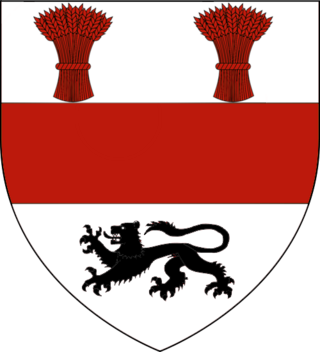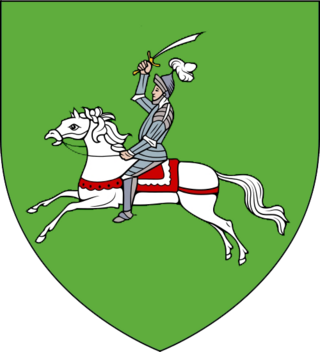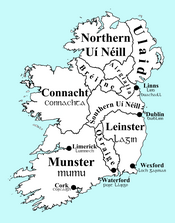Murphy is an Irish surname meaning "Sea Warrior."
Brennan is an Irish surname which is an anglicised form of two different Irish-language surnames: Ó Braonáin and Ó Branáin. Historically, one source of the surname was the prominent clan Ua Braonáin (O'Brennan) of Uí Duach (Idough) in Osraige who were a junior Dál Birn sept stemming from a younger son of Cerball mac Dúnlainge (d.888). Recent surname evaluations highlighted the geographic consistency of this lineage in the barony of Idough. However, based on the ultimate authority of Dubhaltach Mac Fhirbhisigh they are out of Ui Dhuinn (O’Dunn) and, therefore, an Uí Failghi tribe, not Osraige. While it is clearly apparent that O’Hart's pedigree is erroneous, it is suggested that Ó Cléirigh probably became confused while transcribing from Mac Fhirbhisigh. This is echoed by the modern scholar, Bart Jaski.

Livingstone is a surname and given name. The surname is toponymic. It is one of the habitual surnames eventually adopted by members of the Scottish branch of the Irish Dunleavy /MacNulty royals, including the ancestors of the African missionary doctor and African explorer David Livingstone. There may be a relationship between the Livingstones and Clan MacLea.
McIntyre, McEntire, MacIntyre, McAteer, and McIntire are Scottish and Irish surnames derived from the Gaelic Mac an tSaoir literally meaning "son of the Craftsman or Mason", but more commonly cited as "son of the Carpenter." The corresponding English name is Wright. It is common in Ulster and the highlands of Scotland, found in Ireland mostly in counties Donegal, Londonderry, Tyrone and Sligo.
Mac Diarmada, also spelled Mac Diarmata, is an Irish surname, and the surname of the ruling dynasty of Moylurg, a kingdom that existed in Connacht from the 10th to 16th centuries. The last ruling king was Tadhg mac Diarmata, who ruled until 1585.
MacDonald, Macdonald, and McDonald are surnames of both Irish and Scottish Origin. In the Scottish Gaelic and Irish languages they are patronymic, referring to an ancestor with given name Donald.

Kinsella is a surname of Irish Gaelic origin, developed from the original form Cinnsealach, meaning "proud". The Kinsella sept is native in part of the modern County Wexford in Leinster, a district formerly called the Kinsellaghs. The oldest documentary mention of the surname appears in the Ancient Records of Leinster, dated to 1170, where the son of the King of Leinster is named as Enna Cinsealach. Originally pronounced KIN-səl-ə, it is also often found pronounced kihn-SEL-lə. This surname is most often found in Ireland, Northern Europe, Australia and New Zealand.
Clancy is an Irish name coming from the Gaelic Mac Fhlannchaidh/Mac Fhlannchadha, meaning "Son of the red/ruddy warrior", or as a hypocorism for Clarence. The surname originated from two different families, one in Thomond and one in the present day County Leitrim.
Curry is a common surname used in Ireland, Scotland and England. Currey is a less common variant. In England and Scotland, is it thought to derive from local place names and, in Scotland, also possibly from MacMhuirrich.
McLachlan, McLachlan or McLaglen is a surname. It is derived from the Irish MacLachlainn, which is in turn a patronymic form of the Gaelic personal name Lachlann. Notable people with the surname include:
MacDonnell, Macdonnell, or McDonnell is a surname of Scottish and Irish origin. It is an anglicized form of the Gaelic patronymic Mac Dhòmhnaill, meaning "son of Dòmhnall". The Gaelic personal name Dòmhnall is a Gaelicised form of the name Donald, which is composed of the elements domno, meaning "world", and val, meaning "might" or "rule". The name is considered a variation of MacDonald.

Kavanagh or Kavanaugh is a surname of Irish origin, Caomhánach in Irish. It is one of the few Irish surnames that does not traditionally have an O or a Mac in either English or Irish.
McNeill is a Scottish and Irish surname. The name McNeill is often associated with the islands of Gigha and Colonsay. The name is considered a sub-sept of Clan MacNeill, which is historically associated with the island of Barra in the outer Hebrides. The Irish and Scottish Gaelic patronymic meaning of McNeill is 'Son of Neil'. The annals of ulster claim Lóegaire mac Néill as King of Tara or High King of Ireland. The name Neil or Neill derives from the Irish Niall which is of disputed derivation. The Irish name may be derived from words meaning "cloud", "passionate", "victory", "honour" or "champion" As a surname, Neil is traced back to Niall of the Nine Hostages who was an Irish king and eponymous ancestor of the Uí Néill and MacNeil kindred. Most authorities cite the meaning of Neil in the context of a surname as meaning "champion".
Duncan is a Scottish surname. The Scottish Gaelic name Donncheann or Donnchadh are bynames composed of the elements donn, meaning "brown" or "dark" from Donn a Gaelic God; and chadh, meaning "chief" or "noble". In some cases when the surname was used in County Sligo, Ireland, it is an Anglicized form of the Irish Gaelic name MacDonough or Mac Donnchadha and Ó Duinnchinn, meaning "descendant of Donncheann". The surname Duncan is represented in Scottish Gaelic as MacDhonn.
Angus is an English language masculine given name. It is an Anglicised form of the Irish and Scottish Gaelic name Aonghas, which is composed of Celtic elements meaning "one" and "choice". Short forms of the name include Gus, which may be lengthened to Gussie, and Irish Naos. Angie is a common pet form of the name. The feminine form of Angus is Angusina.
McCown is a Goidelic surname with several possible etymological origins.

The name Moriarty is an Anglicized version of the Irish name Ó Muircheartaigh which originated in County Kerry in Ireland. Ó Muircheartaigh can be translated to mean 'navigator' or 'sea worthy', as the Irish word muir means sea and ceardach means skilled. Several prominent people have the Irish name Moriarty, mostly as a surname.
Dolan is a surname of Irish origin. The name Dolan is fairly common today in Ulster, particularly in Cavan, Fermanagh and Tyrone, and also in the Connacht Counties of Roscommon and Galway. The latter is the place of origin of this sept which is a branch of the Ui Máine specifically in the Clonmacnowen Barony in Galway and in the Barony of Athlone in Roscommon.

The Maguire family is an Irish clan based in County Fermanagh. The name derives from the Gaelic Mac Uidhir, which is "son of Odhar" meaning "dun", "dark one". According to legend, this relates to the eleventh descendant of Colla da Chrich, great-grandson of Cormac mac Airt, who was monarch of Ireland about the middle of the third century. From the 13th to the 17th centuries, the Maguire family were kings of Fermanagh.

Crehan or O'Crehan is a surname with origins in the west of Ireland. Historically, it was rendered as Crean, O'Crean, Cregan or O'Cregan. Creaghan and O'Creaghan are a mix of the English language and the Irish language. Cryan is another variant of the name.









